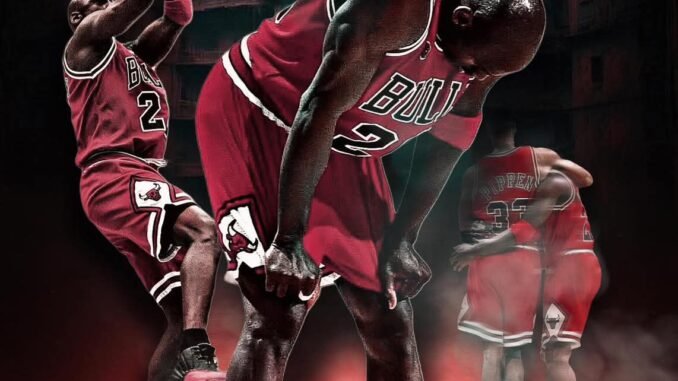
28 Years Later, Jordan’s Iconic 1997 NBA Finals Game Continues to Influence Modern Soccer Stars
In the summer of 1997, Michael Jordan etched his name deeper into the annals of sporting history with what has since become one of the most iconic performances ever witnessed. It was Game 5 of the NBA Finals between the Chicago Bulls and the Utah Jazz. The series was tied 2-2, and the tension in Salt Lake City was palpable. The night before, Jordan had fallen ill with severe flu-like symptoms—later widely believed to have been food poisoning. By every logical measure, he should not have played. But instead, he suited up, stepped onto the court wearing the now-famous Air Jordan 12 sneakers, and delivered a performance that would captivate sports fans for decades to come.
Jordan scored 38 points that night, along with seven rebounds, five assists, three steals, and one defining moment: staggering into Scottie Pippen’s arms as the final buzzer sounded, utterly exhausted but victorious. The “Flu Game,” as it became known, has transcended basketball to symbolize grit, mental toughness, and an almost supernatural will to win.
Interestingly, while the story belongs to basketball, its influence has rippled across sports globally, including the world of soccer. Today, 28 years later, Jordan’s Flu Game continues to serve as a reference point for soccer players striving to achieve greatness even in the face of adversity.
The Parallels Between Basketball and Soccer
At first glance, basketball and soccer may appear worlds apart. The playing surfaces differ, the number of players is vastly different, and the rules barely overlap. But at the core, both sports demand physical excellence, sharp mental focus, and a unique ability to perform under pressure.
Michael Jordan’s Flu Game showcases an aspect of athletic greatness that transcends skill alone: resilience. It is not merely about how many points you score or goals you make; it’s about performing when everything in your body tells you not to. This type of mental fortitude is crucial for soccer players, especially in high-stakes tournaments like the FIFA World Cup, UEFA Champions League, or even domestic leagues that span grueling seasons.
Modern Soccer Stars Drawing Inspiration
Cristiano Ronaldo, one of the most celebrated soccer players of this generation, has often spoken about the importance of mental strength. While he may not have a direct equivalent to the Flu Game, his performances while carrying injuries or personal burdens reflect a similar mentality. Whether it’s pushing through muscle fatigue or delivering under immense scrutiny, Ronaldo exemplifies the type of resilience that made Jordan’s performance so legendary.
Lionel Messi offers another excellent parallel. Messi has faced his share of physical challenges, from early childhood growth hormone deficiency to injuries that threatened his career multiple times. Yet, like Jordan, Messi has consistently elevated his game during crucial moments. His recent performances for Inter Miami in the MLS, despite carrying minor injuries or adapting to new environments, underscore his remarkable mental toughness.

The Psychology Behind Performing Under Adversity
What makes the Flu Game so captivating, and why it resonates with soccer players and fans alike, lies in the psychology of elite performance. Sports psychologists often emphasize the role of mental conditioning as equally important as physical training. The ability to compartmentalize pain, stay focused, and deliver a top-level performance despite external or internal pressures defines legendary athletes.
Jordan, during Game 5, displayed a masterclass in mental toughness. His focus on each possession, his unwavering competitiveness, and his ability to block out the illness and crowd noise demonstrated a psychological resilience that is rare even among elite athletes.
Soccer players often find themselves in similar situations. Whether it is playing a full 90-minute match with a lingering injury, stepping up to take a decisive penalty in a major final, or even dealing with personal tragedies off the pitch, mental fortitude becomes the dividing line between good players and legends.
Cultural Impact and Legacy
The Flu Game is more than just a sports moment; it has become a cultural phenomenon. The iconic image of Jordan leaning into Pippen has been immortalized in countless documentaries, articles, and discussions. In the soccer world, similar moments continue to draw parallels.
Think of Didier Drogba’s heroic performance in the 2012 UEFA Champions League Final for Chelsea, where he played through exhaustion and scored the decisive penalty. Or the countless times Diego Maradona played through immense physical and emotional pain to carry Argentina or Napoli to victories. These moments echo Jordan’s resilience and serve as testament to the universal nature of athletic greatness.
The Enduring Influence on Future Generations
As new soccer talents emerge across the world, Jordan’s Flu Game continues to serve as a masterclass on what it means to compete at the highest level. Young players are often taught about technique, tactics, and physical fitness. However, coaches and mentors increasingly emphasize the importance of mental strength, using stories like Jordan’s as teaching tools.
In modern soccer academies, sports psychologists work alongside coaches to help young athletes develop coping mechanisms for stress, pressure, and adversity. The Flu Game remains a textbook case study in these conversations, showcasing how the mind can override the body when the stakes are highest.
Conclusion: A Universal Lesson
Twenty-eight years have passed since Michael Jordan’s heroic performance, but its lessons remain timeless and borderless. The Flu Game is no longer just a basketball story; it is a sports story, a human story, and, importantly, a soccer story too.
In an era where professional athletes are under immense scrutiny, constantly battling injuries, fatigue, and pressure, Jordan’s Flu Game continues to remind us that greatness is often defined not by talent alone, but by the ability to rise above adversity when it matters the most. As young soccer players lace up their boots across continents, many carry this lesson in their hearts, even if they first heard the story not on a basketball court, but through the universal language of sport.
Leave a Reply